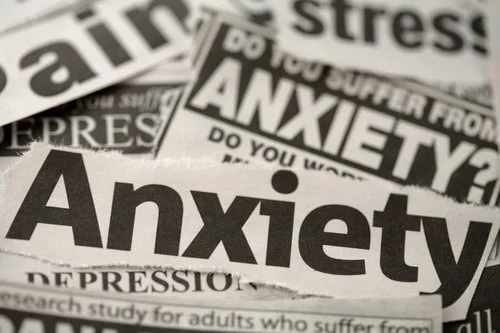Anxiety Treatment In Folsom
Help For Adults, Teens & Children
If you’ve lived with anxiety for some time, you may feel like you’re being chased by one worry after the next. It’s like a weight that’s always pressing down on you, a fear always in the back of your mind. As insecurity grows you then end up missing out on wonderful experiences and opportunities. Your marriage and other important relationships may suffer as well.
Anxiety affects all of us -- on first dates, during job interviews, and within countless other stressful situations. Sometimes, however, anxiety goes beyond what is expected. It begins to take root and presses in on you throughout the day. Your life, which at one time felt more carefree, begins to feel hemmed in and burdened.
If this describes you then it is absolutely time for a change. Time to break free from the grip of fear and live life as you were meant to: confident, unburdened, and eagerly seeking out new adventures.
Getting help for anxiety is simple. One of the easiest ways to move forward is to work with a therapist. Taking this approach is similar to working with a coach. For example, if a baseball pitcher has been having a bad season he may seek out a pitching coach. Together they determine what he is doing differently that has caused him to struggle (whereas he use to be successful). The next step is simply a matter of learning ways to correct these problems so that his real abilities can shine.
In a similar way counselors help those that are anxious by identifying the thoughts that give rise to fear, and helping the client build skills that allows them to be calm and confident.
Is that an easy process? Sometimes, but often not. It takes some work and persistence.
Even so, it can be done. Nearly everyone, of any age, can learn how to gain control over anxiety.
Don’t accept that fear will forever control your life. Fight back, win control, and regain a new sense of peace and freedom. That is what the counselors at Invictus Psychological Services are here to help you do.
what is anxiety?
There are three areas in which anxiety shows up in life: physical sensations
fearful emotions, and
negative thinking.
The physical symptoms often include sweating, heart flutters, fatigue, restlessness, gastrointestinal issues, sleep disturbance, and changes in appetite.
What about emotions and thinking? Different types of anxiety disorders impact thinking and emotions in somewhat different ways.
If you are struggling with obsessive-compulsive disorder (OCD), your day may be filled with fears that you haven’t locked the door, forgot to turn off the oven or have touched something contaminated. You may have to check several times to feel as though a task has been completed correctly. The compulsive behavior relieves your anxiety, but only for a short time.
If you’re dealing with a phobia, then you may devote a lot of time and energy toward avoiding whatever you perceive as dangerous. Folks with phobias often don’t experience anxiety symptoms unless the phobia is present.
With social anxiety, you may retreat from social gatherings and decline invitations to parties or dinner dates, even with people you know and care about. Social anxiety can limit you from taking strides in your relationships and career.
The most common of these disorders is generalized anxiety. With other forms of anxiety, life is a canvas on which various anxieties are painted. For generalized anxiety disorder, the anxiety is the canvas upon which life is painted. When this is the case there will often be times when you’re dealing with anxiety that has no specific target. At other times, the anxiety finds a target (the tendency to obsessively worry about what might happen if....).
Regardless of the particulars, for many people anxiety is a tormenting force that pre-occupies their thoughts, depletes energy, constricts behavior, and constrains life.
Is Anxiety a Common problem?
Absolutely. You see, anxiety disorders are simply a description of when a normal experience like anxiety (which everyone experiences from time to time) becomes so exaggerated that it seriously interferes with life.
According to the National Institute of Mental Health, it’s estimated that nineteen percent of adults experienced anxiety in the past year. Thirty-one percent of adults experience an anxiety disorder during some point in their lives. Moreover, thirty-two percent of adolescents will experience anxiety by the time they reach adulthood.
Anxiety can be caused by a variety of factors. You may be thinking “Well, I’m just stuck with anxiety because my parents were anxious, or because everyone in my family has anxiety. The good news is that even if this is the case, there are ways to fight back against anxiety, worry and fears. Anxiety most often takes control of someone’s life due to having learned, at some point in life, that the world is so dangerous it requires you to always remain on guard.
From an early age, each of us develops a sense of our self, of our ability to handle what comes our way. Over time this shapes our worldview, and how we cope with stress. If you received messages in childhood that made you believe you are not well liked, valued or competent, or if you engaged heavily in high-risk behaviors (that had poor outcomes), then you may have a learned to be anxious.
Every day stressors may also give rise to anxiety, especially those sources of tension that bear down on you each day. A common example of this type of chronic stress is that which arises due to financial debt. The toll this burden extracts can be very high, as seen in the increased rate of divorce and mental health concerns that occur in people who have large amounts of debt.
Those who struggle with anxiety for long periods of time often develop symptoms of depression. You may view yourself and the world through a critical, hopeless lens that makes it difficult to find pleasure. At this point, your lifestyle may be so drastically altered that you’re not living fully. In therapy, we can challenge thoughts, beliefs and emotions that are keeping you stuck.
Therapy Can Help You Overcome Anxiety
Research indicates that talk therapy is the most effective method for treating many, perhaps most, anxiety disorders. Most people who enter counseling end up making significant progress and experiencing a great deal of relief. They learn skills that not only provide freedom from overwhelming anxiety in the present, but can be used to combat anxiety that may arise later in life. Put somewhat differently, therapy is effective at helping people develop greater psychological strength.
During our sessions together, we’ll explore how your history, past relationships and experiences have shaped your current feelings of unease. We’ll also explore the biology of anxiety -- how it affects your mind and body, as well as how worry can be habit forming.
As you become aware of what has caused your anxiety and what is keeping you stuck in unhelpful habits, we’ll examine practical ways to make changes for the better. In truth, anxiety is something that everyone experiences. There is no such thing a lifetime of being anxiety free. There is, however, a huge difference in the quality of life when one learns how to deal with anxiety, rather than be held captive by fear.
You may already have some coping techniques that work well, such as exercising or keeping a journal. Other methods that your counselor may introduce include breathing techniques, grounding, mindfulness, guided imagery, cognitive restructuring, enhancing control and more.
I take a client centered, problem-oriented approach to therapy. This means you ultimately take the lead in determining your goals, and your therapist responds with options for reaching those objectives. Although this approach is compassionate and supportive, it is important for you to understand that progress normally requires a good deal of persistence and effort. As your therapist, we are there to encourage, support, coach and guide you all along the way.
When working with children, parents play a key role in helping their son or daughter learn new skills, and engage in new experiences, that bring lasting change and control over anxiety.
You may still have questions or concerns about anxiety treatment…
I’m worried I don’t have the time or money.
If you’re ready to work through pent-up distress, anxiety therapy is worth investing in. Oftentimes, anxiety doesn’t subside on its own.
Plus, how much more time and/or money have you already wasted on anxiety? Maybe you’ve turned down a promotion at work because it requires being more social. Maybe you’ve missed out on really exciting experiences. What if you could feel confident pursing opportunities that you deserve?
If everyone experiences anxiety, won’t mine go away on its own?
If your anxiety has persisted more than a few months, it’s not likely to subside on its own. At least not very soon, and very possibly it could become more entrenched. Stress can impact your mind and body in acute ways. It pays to have the effective skills needed to battle any long-held beliefs and behaviors that are keeping you stuck in a negative loop.
I don’t want to talk to a stranger about my anxiety. It’s embarrassing.
It is very unlikely that you’re going to tell me something I’ve not heard before in one form or another. That doesn’t mean your struggles aren’t valid or urgent; however, the truth is that anxiety is a very common mental health issue. You have nothing to feel ashamed of.
I understand that talking about anxiety may be uncomfortable, but the outcome is relief. Imagine feeling free from the burden of crippling fear. Life is too short to have anxiety hanging over you.
Cost of Therapy
If you’re curious, here is the breakdown of the cost of counseling:
15-minute phone consultation: free
Per meeting fee of $150 (45-50 minute meeting)
Ready to Feel Better?
If you have additional questions about anxiety therapy, please call me at (916) 790-5138. You can also text me if this is easier (see top of page). I’m happy to discuss your specific needs and answer any questions related to my Folsom California counseling practice.

















